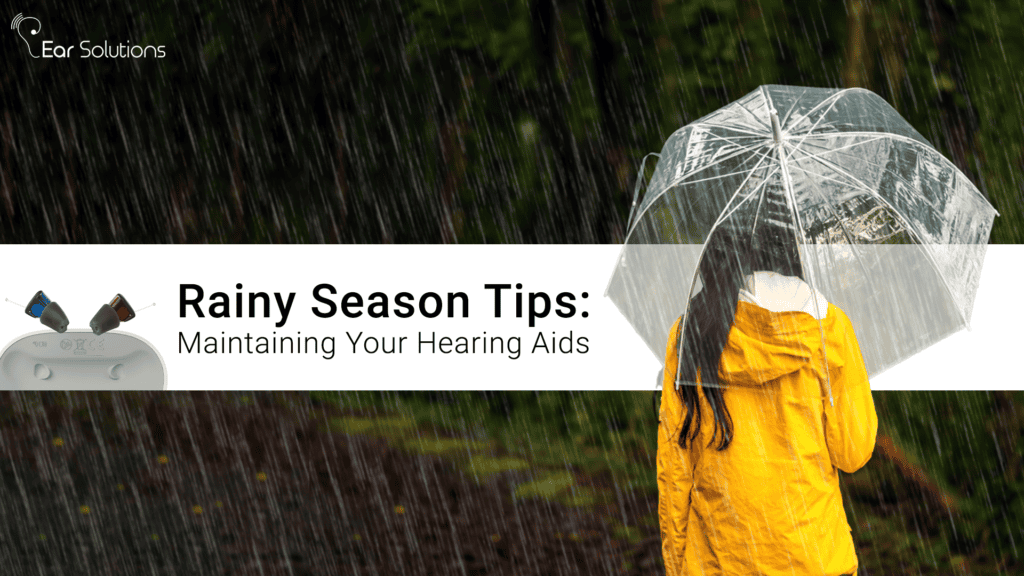The rainy season brings its own set of challenges for everyone, but for hearing aid users, it requires extra awareness. Moisture can significantly impact the performance of hearing aids, leading to costly repairs or even the need for replacements. Proper maintenance during the rainy season is crucial to ensure your hearing aids remain in optimal working condition. Here are some comprehensive tips to help you take care of your hearing aids during the rainy season.
1. Use Hearing Aid Covers and Sweatbands
Tip: Invest in protective covers or sweatbands designed for hearing machines. These accessories provide an additional layer of protection against moisture, whether from rain, sweat, or humidity.
Why It Helps: Covers and sweatbands can help prevent water from seeping into the delicate components of your hearing aids, thus reducing the risk of damage.
2. Dry Your Hearing Aids Regularly
Tip: Use a hearing aid dehumidifier or drying kit to remove any moisture that may have accumulated during the day. It’s advisable to dry your hearing aids every night.
Why It Helps: Regular drying prevents moisture build-up, which can lead to corrosion and malfunction of the hearing aids’ internal parts.
3. Avoid Wearing Hearing Aids in Heavy Rain
Tip: If you’re caught in a heavy downpour, try to remove your hearing aid devices and store them in a waterproof case. Alternatively, wear a wide-brimmed hat or use an umbrella to shield yourself from the rain.
Why It Helps: Direct exposure to heavy rain can quickly damage hearing aids. Taking precautionary measures minimizes the risk of moisture-related issues.
4. Be Cautious with Humidity
Tip: In high-humidity environments, such as tropical areas or during the rainy season, use a dehumidifier at home to keep the air dry. Store your ear machines in a dry, cool place when not in use.
Why It Helps: Humidity can cause condensation inside the hearing aids, leading to electrical problems. A dehumidified environment helps keep moisture at bay.
5. Regular Cleaning
Tip: Clean your hearing aids regularly using a soft, dry cloth. Avoid using water or cleaning solutions directly on the devices. Make sure to clean ear moulds and domes as well, as they can accumulate moisture.
Why It Helps: Regular cleaning helps remove any moisture, earwax, or debris that can interfere with the hearing aids’ performance.
6. Check for Moisture Indicators
Tip: Some hearing devices come with moisture indicators that change colour when they detect moisture. Regularly check these indicators to stay ahead of any potential issues.
Why It Helps: Early detection of moisture allows you to take preventive measures before any serious damage occurs.
7. Carry a Waterproof Case
Tip: Always carry a small waterproof case with you. If you find yourself in a situation where you need to remove your hearing aids, having a waterproof case ensures they are stored safely.
Why It Helps: A waterproof case provides immediate protection from unexpected rain or high humidity, safeguarding your hearing aids from moisture exposure.
8. Use a Hearing Aid Dryer
Tip: Consider using an electronic hearing aid dryer that uses gentle heat or a fan to thoroughly dry out your hearing aids.
Why It Helps: An electronic dryer is more effective than air drying and can ensure that your hearing aid machines are free from moisture, extending their lifespan.
9. Regular Maintenance Check-Ups
Tip: Schedule regular check-ups with your audiologist or hearing aid provider, especially during or after the rainy season.
Why It Helps: Professional maintenance can identify and fix any moisture-related damage early, preventing more severe issues down the line.
10. Insurance for Your Hearing Aids
Tip: Ensure your hearing aids are covered by insurance that includes protection against water damage.
Why It Helps: In case of accidental water damage, having insurance can save you from expensive repair or replacement costs.
Conclusion
Maintaining your hearing aids during the rainy season requires extra care and attention to prevent moisture-related damage. By using protective accessories, regularly drying and cleaning your devices, and taking preventive measures, you can ensure that your hearing aids remain in good working condition. Remember, a little effort in maintenance can go a long way in extending the life and performance of your hearing aids. If you encounter any issues or need additional advice, consult with an audiologist at Ear Solutions for tailored solutions and support.

Prerna Singh
Audiologist, Ear Solutions
Prerna Singh is an Audiologist at Ear Solutions, focused on delivering compassionate, patient-centric hearing care. She works closely with individuals to understand their hearing concerns and guide them toward practical, technology-driven solutions that improve everyday communication and confidence.
At Ear Solutions, Prerna supports the organization’s long-standing mission of transforming lives through better hearing. She is committed to hearing awareness, accurate assessments, and continuous patient support-ensuring every individual receives the care they need to hear better and live better, in line with the vision of #AbSabSunenge.





